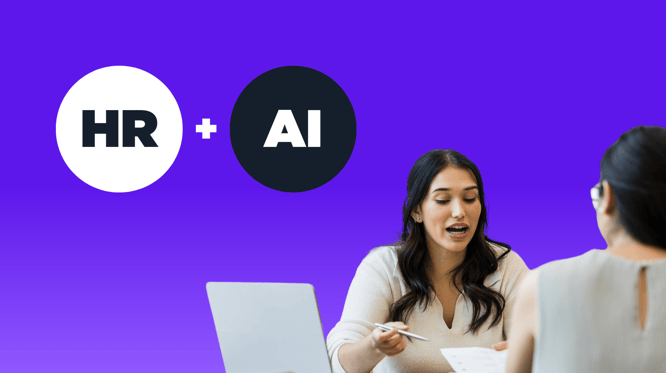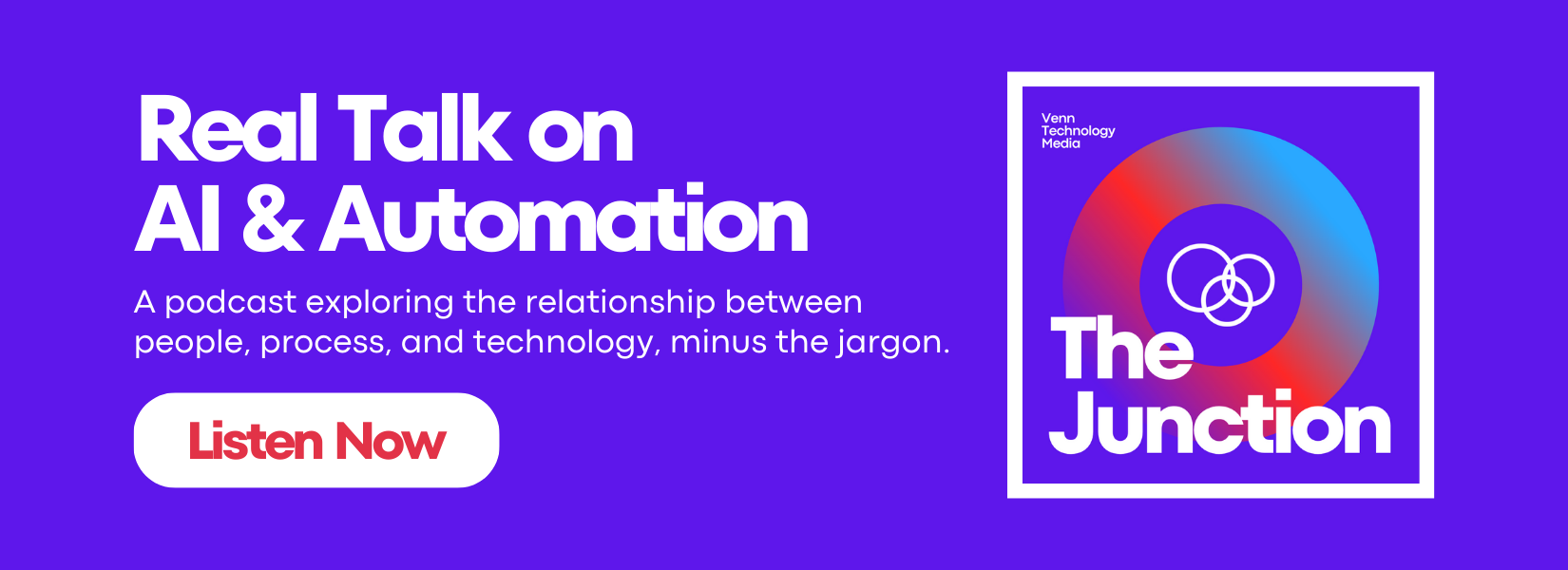Streamline HR Processes and Improve Recruiting With AI
Written byMelissa Bell

If you’re an HR or recruiting leader, you know the struggles all too well. Manual processes that eat up time. Data that’s trapped in silos. Trouble attracting and engaging the best talent. Sound familiar? Well, you’re not alone.
In this blog, we’ll look at how AI can be an HR professional’s new best friend when it comes to eliminating inefficiencies and competing for top talent–including what AI still can’t conquer just yet.
Pain Points for HR and Recruiting Teams
Let’s start with the pain points. HR professionals often spend too much time buried in paper-based processes and spreadsheets than on strategic initiatives. Everything takes longer when it’s manual, and good luck getting data-backed insights.
Some of the most common pain points seen within HR teams include:
- Manual workflows: Significant time spent on administrative tasks like filing paperwork, updating spreadsheets, and copying data between systems. This is inefficient.
- Lack of insights: With manual processes, there is limited visibility into the talent pipeline. It's challenging to identify bottlenecks or trends.
- Poor candidate experience: Slow response times and lack of communication frustrate candidates and make it harder to compete for top talent.
- Compliance risks: Data security and adherence to regulations like Family and Medical Leave Act (FMLA) and Fair Labor Standards Act (FLSA) FLSA require diligence. Manual processes increase compliance risk.
Meanwhile, recruiters face a constant time crunch. It’s time-consuming to manually post jobs, source candidates, schedule interviews, and communicate updates at the volume and speed needed. Without data, it's also hard to avoid unconscious biases. And lengthy processes mean losing qualified candidates to faster-moving competitors. Not fun.
Recruiters face similar challenges:
- Time constraints: It's difficult to manually source, screen, and communicate with enough candidates to meet hiring goals.
- Biased decisions: Without data, choices may be influenced by personal biases. This can lead to poor long-term fits.
- Losing candidates: Lengthy hiring processes lead some candidates to accept offers elsewhere. Strong talent is lost.
The good news? AI is already transforming HR workflows and recruiting for the better. Let’s look at some of the key superpowers.
Key Benefits of AI for HR and Recruiting
AI-driven HR and recruiting platforms help teams work more efficiently and make more informed talent decisions. Key benefits include:
1. Automating Repetitive Tasks
AI chatbots and virtual assistants handle frequent administrative work like answering basic employee questions, documenting sick days, scheduling interviews, and sending rejection emails. This alleviates HR workload.
Recruiters can use AI to swiftly screen applicants and identify best fits. Bots also help automate scheduling, enabling more time for relationship building.
2. Optimizing HR Workflows
AI examines existing HR processes and recommends ways to streamline workflows. Alerts ensure protocols like background checks are completed on time and document processing is automated.
For recruiting, AI tracks each step in the hiring process and prompts next actions to prevent delays. Now that’s how you move candidates smoothly through the funnel.
3. Generating Talent Insights
AI analyzes employee and applicant data to reveal trends like:
• Most common reasons for leaving
• Skill gaps across the organization
• Candidate sources generating the best hires
These insights enable more strategic workforce planning and talent decisions. Recruiters can see which job posts generate the strongest applicants.
4. Removing Biases
AI helps remove human biases like age or gender from the equation using skills-based data. This leads to more equitable and accurate hiring based on abilities, not personal preferences. It also highlights diversity gaps across the organization, allowing recruiters to adjust strategies.
5. Improving Candidate Experience
AI chatbots can be set up to engage with candidates 24/7 to provide quick, personalized updates and answer commonly asked questions while automation speeds up processes behind the scenes.
Plus, analyzing past data enables AI to predict potential drop-off risks and recommend process tweaks to delight candidates.
6. Ensuring Compliance
AI tracks compliance requirements across locations and reminds managers of upcoming deadlines. It audits processes to catch potential issues early.
Recruiters can instantly check applicant backgrounds for any red flags. HR teams spend less time on compliance admin.
7. Strengthening Data Security
HR data requires top-notch security, and AI delivers. Robust protocols and blockchain technology lock down applicant and employee information.
Additionally, controls and data residency restrictions keep data air tight across regions to identify and mitigate fraudulent activity.
8. Generating Cost Savings
All this automation and optimization means big time and cost reductions. We’re talking 20-30% less HR overhead and 50% fewer hours per hire.
Now, recruiters can stretch their impact further without expanding headcount. Net-net? AI lets HR do more with less.
What AI Can't Conquer (Yet)
Now, AI isn’t magic. There are still some uniquely human elements required:
- Building trusted relationships
- Navigating complex organizational politics
- Providing compassion and empathy
- Thinking strategically and creatively
So while AI is a powerful productivity tool, it isn’t replacing human resources pros entirely. But used thoughtfully, it can absolutely be used to make teams more effective.
Key Takeaways on AI in HR and Recruiting
Some key points on AI-driven transformation in HR and recruiting:
- AI automates repetitive administrative work for significant time and cost savings.
- It provides data-driven insights for more strategic talent decisions powered by machine learning.
- Key benefits range from better candidate experiences to unbiased processes and reduced compliance risks.
- Current limitations prevent AI from wholly replacing human capabilities like relationship-building. But it optimizes HR workflows.
AI adoption will only grow as technology improves. Forward-thinking HR leaders are embracing AI now to position their teams for success. With thoughtful implementation, AI can drive the evolution of HR.
To hear more on how AI is - and isn’t - transforming work, be sure to check out The Junction, a podcast by Venn Technology about AI and automation without the technical jargon:

About the Author
Melissa Bell
Director of Sales & Marketing

